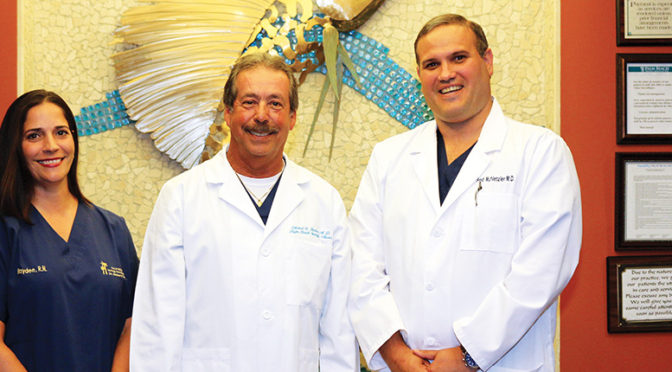Wellington The Magazine-July 2016
Palm Beach Urology Associates Raises The Bar In Robotic Surgery
Story and Photos by Julie Unger
Dr. Fred Muhletaler, a specialist in the da Vinci Surgical System, has joined the Wellington-based urology practice.
Although the basics of urology remain the same, technology has changed by leaps and bounds in the 31 years since Dr. Edward Becker began Palm Beach Urology Associates.
Originally a solo practice, Palm Beach Urology Associates has grown substantially, with several doctors on staff serving four locations. In 1990, Dr. Rafael Lopez joined the practice, followed by Dr. Damian Portela and Dr. Georgis Patsias.
“Several years ago, the robotic aspect of urology came into the picture, and at one point, Dr. Portela and I both got trained to do robotics,” said Becker, a longtime Wellington resident. “During that time, I realized that in order to really do robotics the way it needs to be done, it needs to be somebody who has a lot of experience and a lot of training.”
Their results were good, but it took Portela and Becker a long time in the operating room. They decided it was time to bring a robotics specialist into the practice, especially since there wasn’t, at the time, anyone in the county who was a fellowship-trained robotics surgeon, Becker explained.
One of the newest members on Becker’s team is Dr. Fred Muhletaler, of Palm Beach Advanced Robotics, who specializes in utilizing robotic surgery to treat urologic cancers such as bladder, prostate and kidney, and reconstructive procedures to reestablish function.
“I was very interested in the robotic technique since I first came into contact with it in 2001,” Muhletaler explained. “I was a medical student, and I decided to rotate at Henry Ford Hospital — and all of a sudden I saw a robot in the operating room. I just thought that was going to be the way major surgery in urology, and in general, was going to be done in the future.”
In 2006, Muhletaler joined the department as a clinical research fellow before completing his residency and spending two fellowship years working in urologic oncology.
The team he worked with truly was pioneering the field, and Muhletaler has had involvement with more than 1,200 robotic cases, of which approximately 900 were radical prostatectomies for prostate cancer, during his approximately 10 years at Henry Ford Hospital.
“My chairman in Detroit, his name is Dr. Mani Menon, is the guy who did the first radical prostatectomy in the United States,” Muhletaler said. “He is the guy who really pioneered robotics in the field. He’s my mentor, and he is regarded as the father of robotics in urology. He pushed the field forward. He pioneered and standardized surgical techniques in all of the commonly done surgeries done in urological cancer.”
Muhletaler joined the Palm Beach Urology Associates team in August 2015 after meeting them and learning about the need for minimally invasive robotic surgery in the area. He has primary privileges at four nearby hospitals with robotic systems — Palms West Hospital, Wellington Regional Medical Center, JFK Medical Center and Palm Beach Gardens Medical Center.
“We’re able to do major surgeries, specifically for urologic cancer, but also for reconstructive procedures, with hospital stays of one or two nights at the most, with very minimal pain and being very successful with controlling the cancer and reestablishing function within the urinary system,” Muhletaler said.
A common misconception, he explained, is that people think robotic surgery is programmed and the doctor just sits back and watches. That couldn’t be further from the truth.
The da Vinci Surgical System robot — the only one approved by the FDA — acts as an extension of the doctor’s hands. Imagine taping skewers to your fingers and then trying to type — it isn’t an easy task, and is one which requires skill, precision, specialized training and hours upon hours of practice.
“It’s something you really have to be doing every day,” Becker said.
The kidneys and prostate are deep organs that are difficult to get to and require larger incisions in traditional open surgery, Muhletaler explained. In robotics, by utilizing small holes in the abdomen, doctors are able to have the view of open surgery, with minimal cuts that cause less pain.
Typically, with a prostate removal, the patient will be in the hospital between three and five days with open surgery. With robotics, it is only one night. Patients are able to return to work within a few weeks rather than six to eight weeks.
“It makes a significant difference,” Muhletaler explained. “The surgical pain, that is a large part of the surgical recovery, is greatly improved.”
Having a great team is also important to excelling.
“Before Dr. Muhletaler got here, this practice already did very big surgical procedures; we just did them open,” Becker said. “In order to do big surgical procedures, you need a good assistant. Haydee Rodriguez, RN, joined our practice nine years ago, and she is the primary surgical assistant for this practice… Palm Beach Urology really is a comprehensive urologic practice. There’s really nothing that we don’t do, and in order to be able to do something like that, the surgical assistant is key.”
Rodriguez, Becker’s niece, is now Muhletaler’s surgical assistant in robotic surgery.
“It’s very interesting, the views that you get, and being able to reach everything without having to cut the patient open with a big incision. Just seeing the recovery is amazing,” she said. “It’s just really amazing, the technique, and seeing Dr. Muhletaler work with it — it’s amazing, the things he can do with it.”
Palm Beach Urology Associates has locations in Wellington (3347 State Road 7, Suite 101), Palm Springs (1620 S. Congress Ave., Suite 202), Boynton Beach (8198 Jog Road, Suite 209) and Belle Glade (1100 S. Main St.). For more information, call (561) 790-2111 or visit www.palmbeachurology.com.
